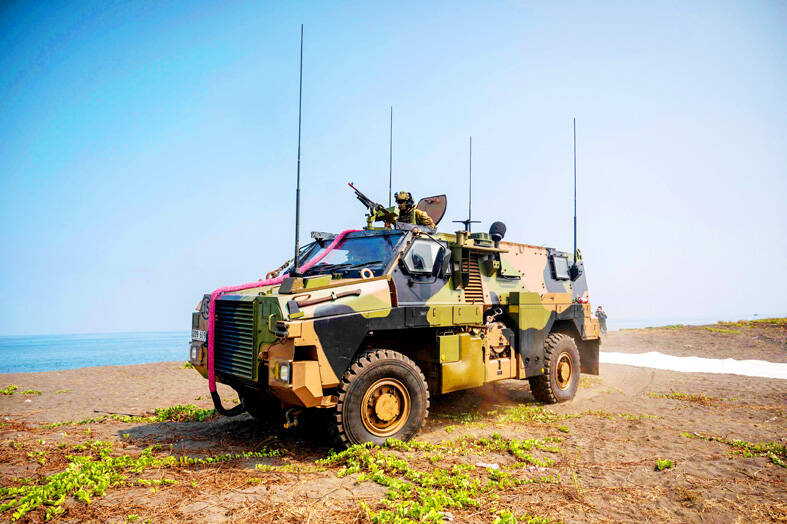The Indonesian and Australian militaries yesterday began joint combat drills off Indonesia’s main island of Java with about 2,000 troops training in air, maritime, amphibious and land operations.
They are participating in a live-fire exercise near Banongan beach of East Java’s Situbondo district with tanks, artillery, infantry and attack helicopters, a joint landing operation and a non-combat evacuation used for a disaster.
The four-day Keris Woomera 2024 (KW24) exercise highlighted the cooperation between the countries strengthened by the signing of the Australia-Indonesia Defense Cooperation Agreement in August.

Photo: AFP
Although Indonesia is often presented as one of Australia’s most important neighbors and strategic allies, the relationship has fluctuated.
Recent disagreements include allegations that Australia had wiretapped private phone calls of a past Indonesian president, Indonesia’s use of capital punishment on Australian drug smugglers and the smuggling of migrants.
“This joint exercise aimed to strengthening the partnership between Indonesia and Australia as we are building trust and to increase capabilities and interoperability,” said Indonesian Lieutenant Colonel Empri Airudin, who leads the Indonesian delegation.
“It can also be regarded as a way of maintaining security and stability in the region,” Airudin said.
The exercise is also part of Indo-Pacific Endeavour 2024, Australia’s largest international engagement activity in the region, taking place in Australia and Indonesia, Australian Amphibious Task Force Commander Captain Chris Doherty told reporters.
“This bilateral exercise will test all facets of the Australian Amphibious Task Force, and allow all its components to work effectively together as a cohesive team with our Indonesian partners,” he said, adding that the KW24 could provide the troops of the two nations with the ability to rapidly deploy forces in response to a range of missions.
Analysts consider Indonesia’s defense a priority of Indonesian President Prabowo Subianto. He wants to expand his military by buying submarines, frigates and fighter jets, and wants to initiate more defense cooperation with various countries.
Indonesia has held military exercises with other countries, including the Russian navy on Monday last week in Indonesia’s East Java seas.
Last month, Indonesia said its patrol ships drove away a Chinese coast guard ship that disrupted a survey being undertaken by a state-owned energy company in a part of the South China Sea disputed by both countries.
China has rapidly expanded its military and has become increasingly assertive in pursuing territorial claims in the South China Sea, which Beijing claims virtually in its entirety. The tensions have led to more frequent confrontations, primarily with the Philippines and Vietnam, though the longtime territorial disputes also involve Taiwan, Malaysia, Indonesia and Brunei.
However, during Subianto’s first overseas visit as Indonesia’s new leader to Beijing during weekend, he called for collaboration rather than confrontation with China after the signing of US$10 billion in new deals at a business forum before departing to the US on Sunday.
He and Chinese President Xi Jinping (習近平) agreed to hold a first-ever joint meeting of their foreign and defense ministers next year.

MONEY GRAB: People were rushing to collect bills scattered on the ground after the plane transporting money crashed, which an official said hindered rescue efforts A cargo plane carrying money on Friday crashed near Bolivia’s capital, damaging about a dozen vehicles on highway, scattering bills on the ground and leaving at least 15 people dead and others injured, an official said. Bolivian Minister of Defense Marcelo Salinas said the Hercules C-130 plane was transporting newly printed Bolivian currency when it “landed and veered off the runway” at an airport in El Alto, a city adjacent to La Paz, before ending up in a nearby field. Firefighters managed to put out the flames that engulfed the aircraft. Fire chief Pavel Tovar said at least 15 people died, but

LIKE FATHER, LIKE DAUGHTER: By showing Ju-ae’s ability to handle a weapon, the photos ‘suggest she is indeed receiving training as a successor,’ an academic said North Korea on Saturday released a rare image of leader Kim Jong-un’s teenage daughter firing a rifle at a shooting range, adding to speculation that she is being groomed as his successor. Kim’s daughter, Ju-ae, has long been seen as the next in line to rule the secretive, nuclear-armed state, and took part in a string of recent high-profile outings, including last week’s military parade marking the closing stages of North Korea’s key party congress. Pyongyang’s official Korean Central News Agency (KCNA) released a photo of Ju-ae shooting a rifle at an outdoor shooting range, peering through a rifle scope

South Korea would soon no longer be one of the few countries where Google Maps does not work properly, after its security-conscious government reversed a two-decade stance to approve the export of high-precision map data to overseas servers. The approval was made “on the condition that strict security requirements are met,” the South Korean Ministry of Land, Infrastructure and Transport said. Those conditions include blurring military and other sensitive security-related facilities, as well as restricting longitude and latitude coordinates for South Korean territory on products such as Google Maps and Google Earth, it said. The decision is expected to hurt Naver and Kakao

India and Canada yesterday reached a string of agreements, including on critical mineral cooperation and a “landmark” uranium supply deal for nuclear power, the countries’ leaders said in New Delhi. The pacts, which also covered technology and promoting the use of renewable energy, were announced after Indian Prime Minister Narendra Modi and Canadian Prime Minister Mark Carney hailed a fresh start in the relationship between their nations. “Our ties have seen a new energy, mutual trust and positivity,” Modi said. Carney’s visit is a key step forward in ties that effectively collapsed in 2023 after Ottawa accused New Delhi